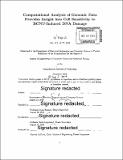Computational analysis of genomic data provides insight into cell sensitivity to BCNU-Induced DNA damage
Author(s)
Ji, Yuge.
Download1145122891-MIT.pdf (7.827Mb)
Other Contributors
Massachusetts Institute of Technology. Department of Electrical Engineering and Computer Science.
Advisor
Leona Samson and Bevin Engelward.
Terms of use
Metadata
Show full item recordAbstract
The transcriptional response to DNA damage plays a critical role in cellular responses to exogenous stress, and is a key component of resistance to therapeutics in cancer cells. Understanding the underlying mechanisms, as well as the differences in DNA damage responses, between cell lines can have implications for how we evaluate drug treatments, and contributes to our understanding of cellular growth and replication. Here, I have analyzed a dataset previously created by Chandni Valiathan, replicating and expanding beyond her initial analyses. Dr. Valiathans initial studies clearly show that cell lines derived from different individuals are highly variable in their sensitivity to BCNU. We therefore set out to determine mechanisms underlying this difference in phenotypic responses. Using gene expression analysis methods, we determined that the transcription factor NF-Y plays a key role in the differential response among cell lines, which is consistent with a model wherein transactivation of genes related to DNA repair, cell cycle arrest, and apoptosis together dictate cell fate.
Description
Thesis: M. Eng., Massachusetts Institute of Technology, Department of Electrical Engineering and Computer Science, 2019 Cataloged from PDF version of thesis. Includes bibliographical references (pages 38-43).
Date issued
2019Department
Massachusetts Institute of Technology. Department of Electrical Engineering and Computer SciencePublisher
Massachusetts Institute of Technology
Keywords
Electrical Engineering and Computer Science.